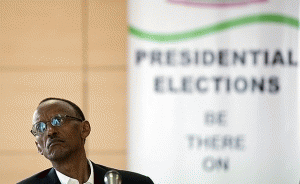You wonder just how long the United States will tolerate the egregious human rights violations taking place in Rwanda in the days before the upcoming elections. Today, Human Rights Watch demanded that the government of Rwanda allow independent foreign experts to carry out an autopsy on the body of Andrà � Kagwa Rwisereka, vice president of the opposition Democratic Green Party.
Rwisereka was last seen late in the evening of July 12, 2010. In a scene reminiscent of the atrocities of the genocidal massacres of 1994, his body was found near the southern town of Butare on July 14. His head had been severed, and witnesses described unusual marks on several parts of his body.
This is the second killing of an outspoken critic of the government of Paul Kagame in less than a month. US diplomatic circles have gone silent. Just when it seemed that Secretary of State Hillary Clinton was going to hold all central African dictators' feet to the fire, the silence of the United States is offering tacit approval to the Kagame regime and elections that are being rigged with fear.
HRW says, "The murder may have been linked to his newspaper's critical stance and the sensitive investigations he was conducting in the days leading up to his death, including on the attempted murder of former general Faustin Kayumba Nyamwasa in South Africa."
Umuvugizi, along with the other main independent newspaper Umuseso, was suspended for six months by the Media High Council in April 2010, effectively preventing it from covering events in the election period.
I consider myself a friend of the Rwandan people, but not this. It cannot stand. President Obama should confront these atrocities and attacks on human rights and back his Secretary of State in a condemnation of the current government of Rwanda.
In a late evening press release on Tuesday, HRW reports events leading up to Rwisereka's death indicate that the murder may have been politically motivated. He had long told close friends and colleagues that he feared being killed as a result of his opposition to the Rwandan Patriotic Front (RPF), Kagame's ruling party. In recent weeks, Rwisereka had seemed increasingly concerned about his safety.
In late June, the former Green Party secretary general, Charles Kabanda, visited Rwisereka at the Sombrero Club, the bar run by Rwisereka in Butare, and tried to convince him to leave the Green Party. Rwisereka had told people close to him that Kabanda, who left the Green Party earlier in the year, had told him that the RPF would never allow Rwisereka to leave the "family" referring to the RPF and questioned what would happen to members of the Green Party. Rwisereka told people close to him that he interpreted this as a threat.
Ironically, Rwisereka was a longstanding member of the RPF, the former rebel movement that carried out attacks against Rwanda from Uganda in 1990. In 1994 the RPF overthrew the Hutu government and ended the 1994 massacre of Tutsi's. It is still in power today.
HRW says Rwisereka had worked closely with high-ranking RPF officials in raising funds for the movement while in exile in the Democratic Republic of Congo, but did not occupy an official position in the party or in the government after it assumed power. In 2009, he left the party to create the Democratic Green Party a new opposition party with other former RPF members.
Several other critics of the government have been targeted in recent weeks. On June 24, Jean-LÃ �onard Rugambage, a journalist with the independent newspaper Umuvugizi, was shot dead outside his home in Kigali, the capital. HRW says his murder may have been linked to his newspaper's critical stance and the sensitive investigations he was conducting in the days leading up to his death, including on the attempted murder of former general Faustin Kayumba Nyamwasa in South Africa.
Umuvugizi, along with the other main independent newspaper Umuseso, was suspended for six months by the Media High Council in April 2010, effectively preventing it from covering events in the election period. Many independednt journalist have fled the country or are in hiding.
In February 2007, a group of assailants attacked the independent newspaper Umuvugizi's editor, Jean-Bosco Gasasira, in a near fatal incident outside his house, after he spoke out at a presidential news conference about the harassment of journalists. No one has been brought to justice for the attack.
The leader of the PS-Imberakuri opposition party, Bernard Ntaganda, was arrested on June 24 and remains in detention. He is facing several charges, including endangering national security and inciting ethnic divisions. Several other members of his party, and the FDU-Inkingi, another opposition party, were arrested on June 25. They were released a few days later, but the case against them is pending, HRW says.
For more information see the HRW website.






